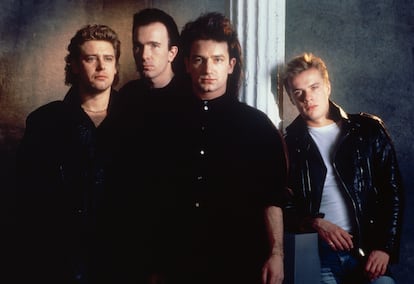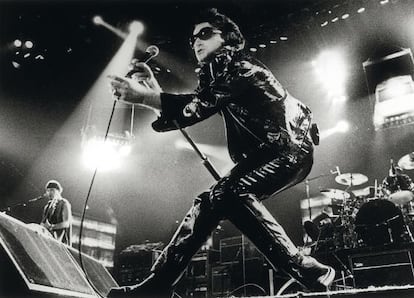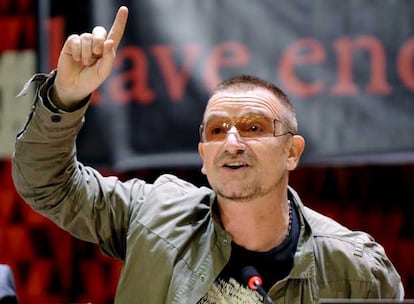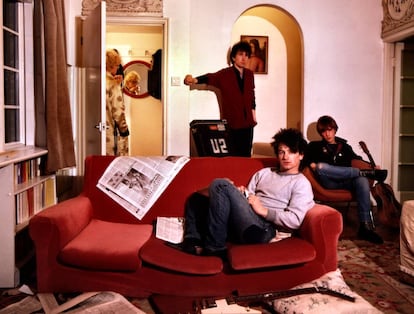U2: The boom and bust of the world’s biggest band
‘Achtung Baby’ was released 30 years ago. The key album of the Irish group’s long career reinvented rock music and catapulted them to fame, but it was also their last great record

“Everything you know is wrong.” The slogan appeared for the first time in the video for The Fly in October 1991, and it would become a refrain of the great Zoo TV Tour (1992-1993). That song, dark, rhythmic, rough and full of intelligent irony, broke radically with the sound and image that U2 had cultivated during the previous decade. The band members – Bono, The Edge, Adam Clayton and Larry Mullen Jr. – had already established themselves as the most important rock band in the world thanks to their fifth album, The Joshua Tree (1987).
At that time, the four young Dubliners were filling the biggest stadiums on the planet every night, and arousing a religious fervor among the masses. One rung above what even Bruce Springsteen could achieve, they restored authenticity to great rock music delivered on a big scale, and as an added bonus lent it a humanitarian commitment during the cruel decade of the 1980s.
Overwhelmed and plagued by insecurities, however, U2 were not enjoying themselves at all. Their next project, the documentary film and double album Rattle And Hum, backfired. What they meant to sell as a tribute to their discovery of rock’s American roots was anything but humble. Critics began to turn their backs on them and frequently used terms such as “megalomaniacs” and “messianic” to refer to the quartet.

In the 1990s, U2 went into crisis. It began with a performance at Point Depot in their hometown on New Year’s Eve 1989 that was broadcast globally on radio and TV and where they symbolically said goodbye to the Stetson hats of Rattle And Hum, to welcome the new Europe that was emerging after the fall of the Berlin Wall. Relatively fed up with themselves, they arrived at Hansa Studios in Berlin in late 1990, a legendary place where David Bowie and Iggy Pop had recorded. Either they would reinvent themselves, or they would break apart.
The sessions were traumatic until One was conceived, symbolizing the band’s stronger union in a Germany that had just pieced itself back together. Achtung Baby was electronic and rhythmic, with a dark and sexual vibe. It featured Bono’s best lyrics and shifted the paradigm of what successful bands should do to remain influential. In a time of conflict, and with their vulnerability on the surface, U2 achieved the greatest triumph of their career. Even their biggest detractors eventually admitted that there was something interesting there.
It went even further in their live performances. The Zoo TV Tour was a great postmodern game that allowed them to laugh a little at themselves, to add theatrical effects to their show and to anticipate the new information society. With the internet still in its infancy, multi-screen messages scrolled by, and there were simultaneous video duets with Lou Reed. They called the White House, live. Among their list of opening acts they chose the Pixies, Public Enemy, The Velvet Underground, The Ramones, The Sugarcubes, Björk, PJ Harvey and Pearl Jam, proof that they wanted to nurture the next generation of alternative music.
In the middle of the tour, they did something even more unusual: they recorded and released Zooropa, the unofficial B-side of Achtung Baby. A more radical and risky album, they were only able to play a few songs live a handful of times, though the record deserves to be rescued for The Wanderer, a post-apocalyptic parable sung by Johnny Cash. U2 had become the standard-bearer of creative risk as a symbol of global triumph, a quality perhaps only shared by The Beatles, but even then some were pointing out that the emperor was walking around with no clothes on.

In the penultimate chapter of The Captain Is Out to Lunch and the Sailors Have Taken Over the Ship, a memoir of Charles Bukowski’s last days, the writer describes (without naming names but it’s easy to guess) the night Bono invited him to a concert at Dodger Stadium. “There was a vibrancy there but it was short-lived. It was fairly simplistic. I suppose the lyrics were all right if you could understand them. They were probably speaking of Causes, Decencies, Love found and lost, etc. People need that – anti-establishment, anti-parent, anti-something. But a successful millionaire group like that, no matter what they said, THEY WERE NOW ESTABLISHMENT. Then, after a while, the leader said, ‘This concert is dedicated to Linda and Charles Bukowski!’ 25,000 people cheered as if they knew who we were. It is to laugh.”
U2 would never again have that agenda-setting relevance as a band at the vanguard of their era. Inspiration never resurfaced, and bad decisions began to multiply, until they became a band that arouses as much rancor as admiration. Here is a chronology of their decline in a few unfortunate milestones.
1995
Hold Me, Thrill Me, Kiss Me, Kill Me, recorded for the Batman Forever soundtrack, was their first bland single since Two Hearts Beat As One (1983). They released a semi-experimental album with the title Passengers, with Brian Eno as a fifth member, but it was quickly forgotten. “There’s a thin line between interesting music and self-indulgence. We crossed it on the Passengers record,” Larry Mullen would say years later in the book U2 by U2.
1997
Their ambitious new tour was already booked, but the new album Pop was not going to be finished on time. U2 didn’t seem to know what they wanted, and delayed its release several times. Some songs edged towards a more kitsch, electronic direction, and others harked back to a more mellow, classic pop rock. Meanwhile Bono was losing his voice, and the Popmart Tour was getting out of hand. A massive, expensive set-up for stadiums to make an ironic comment about consumer society seemed to miss its own point quite badly. There was a giant mechanical lemon that didn’t function properly, and the band got trapped inside on more than one occasion. For the first time in years, some concerts did not sell out, and there were boos in Barcelona when they shocked fans with a karaoke performance by The Edge of Macarena by Los del Río.
1999
Bono met Pope John Paul II on a series of visits to meet world leaders as ambassador of Jubilee 2000, a project aimed at ending the foreign debt of Third World countries. Bono let him try on his sunglasses and later declared that John Paul II was the “first funky Pontiff.”
2000
Bono produced his first and last film script for Million Dollar Hotel, directed by his friend Wim Wenders. It garnered the most devastating reviews ever obtained by the German director and even its star, Mel Gibson, said in an interview that it is “as boring as a dog’s ass.” Even Bono himself seemed to agree. Meanwhile, the album All That You Can’t Leave Behind was hailed by fans as a return to form, but with a more mainstream character. They entered into a dynamic that other groups of their generation, like R.E.M. or Depeche Mode, would also end up assuming: the same, only less. They attended the Amigo Awards ceremony in Madrid and delivered a part-playback performance of their new single, Beautiful Day. They were the big stars of the gala along with Backstreet Boys, Christina Aguilera and the Spanish band Estopa.
2002
Their performance at the Superbowl final became a tribute to the victims of 9/11 and to the United States. Bono began his interpretation of Where The Streets Have No Name by shouting “America!” and concluded it by showing the stars and stripes on the back of his jacket, reaching his peak as an emotional manipulator. Gone were the days when the singer would fly a white flag and say that the only color he saw in other flags was the color of blood.
2004
How To Dismantle An Atomic Bomb delved ever more into epic-sentimental rock designed to please all audiences. The band signed an agreement with Apple and released an exclusive iPod model accompanied by a campaign in which Bono appeared singing Vertigo from screens everywhere. In the documentary From The Sky Down (2011), the vocalist declared that they had started off as punks at age 16, seeing The Clash in Dublin, and there came a time when they realized that they had become the enemy. That was what they had wanted to fight against in Achtung Baby. By now, they were clearly the enemy.
2006
The U2 company moved to the Netherlands to pay less tax, and the ensuing scandal reached the Irish parliament. The members of the group tried to justify the move with unconvincing arguments, including that they were running a global business, or that all companies try to minimize their tax burden.
2008
The group signed a 12-year contract with the multinational promoter Live Nation, which took control of a large part of the product, including management of ticket sales and merchandising. There was something hidden in the small print that would not become known until 2013: their manager Paul McGuinness, the man who had discovered them in 1978 and could be considered the fifth member of U2, would retire as part of the agreement.

2009
They released No Line On The Horizon, the beginning of their trilogy of sadder albums, followed by Songs Of Innocence in 2014 and Songs Of Experience in 2017. Despite the promotional fanfare that accompanied their releases, no particular song became a hit.
2009-2011
The 360º Tour broke records in terms of global box office sales and the sheer scale of the stage set-ups, though this did not necessarily imply artistic health. There was a lot of paraphernalia, but very little substance: fans basically went to listen to old hits rendered tired-sounding by the passing of the years.
2011
U2 performed at Glastonbury. It was their first time at a festival since 1985, and their debut at the British megafestival. Under normal conditions, it should have been a triumphant concert packed with their greatest hits, but the quantity of banners asking them to pay their taxes overshadowed the music. Their performance lacked conviction.
2014
Other megastars were releasing their albums by surprise or posting them directly online (Radiohead, Bowie, Beyoncé), so U2 decided to have their album Songs Of Innocence automatically installed for free on users’ iTunes libraries... without asking for permission first. Instead of celebrating, many users protested angrily because they couldn’t delete the unwanted tracks. Faced with a barrage of protests, Apple was forced to develop an option to get rid of the record. The first spam album in history is still held up today as the perfect example of a completely misguided marketing strategy.
2017
U2’s appearance on the track XXX from Kendrick Lamar’s album Damn was announced. The rapper’s fans protested, while applauding his collaboration with Rihanna on another song. The band’s first nostalgia tour kicked off, celebrating the 30th anniversary of The Joshua Tree. Some fans were happy because the band decided to perform the album in its entirety, but others were bored by the anticlimactic sequencing of the show. Worse still: on their next tour they decided to do the complete opposite and didn’t play a single song from that album.
2021
U2’s latest release is We Are The People, the official theme song of the UEFA European Football Championship performed by Bono and The Edge together with dance music DJ and producer Martin Garrix. The song is so cheesy it’s beyond parody. If at the turn of the millennium Coldplay were hailed as the contender to take U2’s throne, here the theory that U2 are their own tribute band has been confirmed.
Tu suscripción se está usando en otro dispositivo
¿Quieres añadir otro usuario a tu suscripción?
Si continúas leyendo en este dispositivo, no se podrá leer en el otro.
FlechaTu suscripción se está usando en otro dispositivo y solo puedes acceder a EL PAÍS desde un dispositivo a la vez.
Si quieres compartir tu cuenta, cambia tu suscripción a la modalidad Premium, así podrás añadir otro usuario. Cada uno accederá con su propia cuenta de email, lo que os permitirá personalizar vuestra experiencia en EL PAÍS.
¿Tienes una suscripción de empresa? Accede aquí para contratar más cuentas.
En el caso de no saber quién está usando tu cuenta, te recomendamos cambiar tu contraseña aquí.
Si decides continuar compartiendo tu cuenta, este mensaje se mostrará en tu dispositivo y en el de la otra persona que está usando tu cuenta de forma indefinida, afectando a tu experiencia de lectura. Puedes consultar aquí los términos y condiciones de la suscripción digital.








































